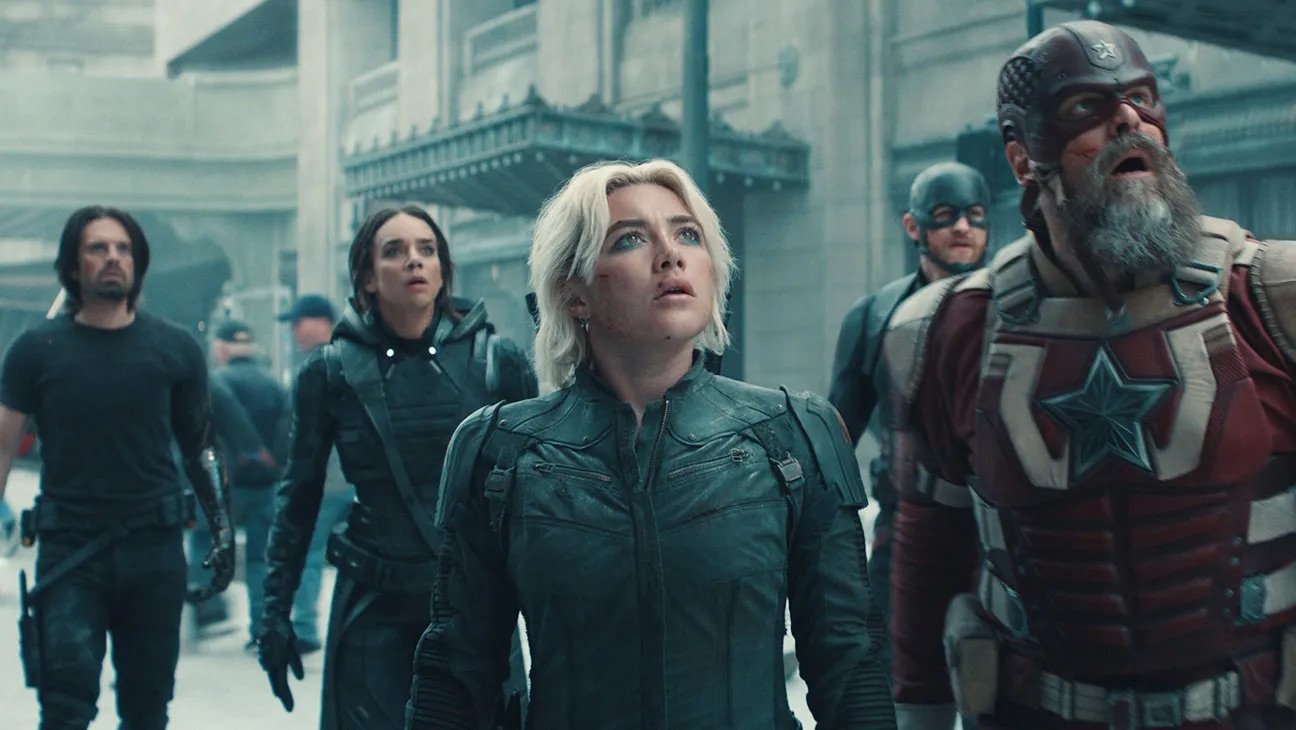‘Thunderbolts*’ Review: That Mysterious Asterisk Masks the Real Reason to Watch These Six Marvel Rejects
From left: David Harbour, Hannah John-Kamen, Sebastian Stan, Florence Pugh and Wyatt Russell in 'Thunderbolts*.' Courtesy of Marvel Studios
Florence Pugh delivers a standout performance in Marvel’s most character-driven and psychologically layered film in years.
For Marvel diehards and disillusioned fans alike, Thunderbolts* is something of an anomaly: it’s not quite a comeback, not quite a misfire, but something more rare — a necessary pivot in a franchise long overextended. This isn’t the franchise reawakening some have been begging for, but it’s unequivocally the smartest, most emotionally literate character work Marvel has dared to offer in years. In a post-Endgame cinematic landscape oversaturated with overpowered heroes, overplotted timelines, and increasingly nonsensical multiverse meanderings, here comes a film that dares to zoom in on something much messier, smaller, and more human: trauma, dysfunction, and the slow, uncertain crawl toward redemption. It’s a film with real narrative risks, uneven textures, and surprising poignancy—and that alone makes it feel like a minor miracle.
Directed by Jake Schreier (Robot & Frank, Beef) and co-written by Lee Sung Jin, Joanna Calo (The Bear, BoJack Horseman), and Eric Pearson (Black Widow, Thor: Ragnarok), Thunderbolts* reframes the ensemble hero format by eschewing grandeur for grit, swapping spectacle for soul. It doesn’t revolve around world-ending stakes or cosmic crises but instead hones in on psychological wounds and moral ambiguity. It’s a Marvel movie that lets characters pause, breathe, and reflect—often while covered in metaphorical (and literal) bruises.
Florence Pugh’s Yelena Belova, once a bright spark of sarcasm in Black Widow, is now the undeniable anchor. Haunted by grief and burdened by the weight of expectation, she’s the reluctant emotional core of the team. Pugh imbues Yelena with deadpan wit and aching vulnerability, delivering a performance that deepens everything that came before. She’s not trying to live up to her sister’s legacy anymore—she’s trying to understand what a legacy even is.
Courtesy of Marvel Studios
Yelena is recruited—or rather, manipulated—into a final mission by CIA puppetmaster Valentina Allegra de Fontaine (Julia Louis-Dreyfus, weaponizing bureaucratic menace). The goal: to clean up traces of experimental super-serum research gone rogue. The catch: she’s sent with a team of operatives who are all expendable. John Walker (Wyatt Russell), Ava Starr aka Ghost (Hannah John-Kamen), Taskmaster (Olga Kurylenko), and her eye-roll-inducing surrogate father Red Guardian (David Harbour) join the fray, their mission quickly unraveling when it becomes clear they were meant to die.
Sebastian Stan’s Bucky Barnes is still carrying the weight of decades as an assassin. He’s the conscience of the group, operating from the shadows to uncover Valentina’s plot and perhaps—finally—make peace with the monster he used to be. Meanwhile, we’re introduced to Bob Reynolds (Lewis Pullman), a deeply sympathetic amnesiac patient whose childlike sweetness masks a terrible power. His identity—The Void—becomes the film’s central mystery, one tied as much to personal despair as it is to physical danger.
Courtesy of Marvel Studios
What makes Thunderbolts* tick isn’t its plot mechanics but its raw emotional focus. The inclusion of “shame rooms”—a literal device where characters confront traumatic memories—could have easily backfired, but instead it’s handled with restraint and genuine insight. Watching Yelena relive her childhood training or John grieve the family he abandoned adds interiority to characters too often sidelined in previous films. These moments matter.
POPULAR ON THE CINEMA GROUP
Visually, cinematographer Andrew Droz Palermo (The Green Knight, A Ghost Story) bathes the film in somber hues and tactile shadows. Gone is the glossy CG sheen of Quantumania or Eternals—here, the world feels grounded and grimy. New York is not a backdrop to be destroyed but a city of real people, real weight. Action sequences unfold with bruising clarity, prioritizing physicality over pyrotechnics.
David Harbour continues to play Red Guardian like a borscht-belt clown philosopher, adding levity without undermining stakes. His relationship with Yelena—gruff, awkward, begrudgingly affectionate—is the film’s emotional compass. And in Julia Louis-Dreyfus, we finally get a Marvel villain who blends bureaucratic evil with genuine strategic threat. Her Valentina isn’t just a snarky cameo anymore; she’s calculating, dangerous, and disturbingly plausible.
Courtesy of Marvel Studios
Musically, Son Lux’s score drifts between melancholy glitch and jittery urgency, setting a mood that’s equal parts meditative and menacing. It’s the rare Marvel soundtrack that complements psychological tone rather than drowning it out.
The third act finds The Void manifesting in his true form—unleashing chaos but also forcing the Thunderbolts to confront whether heroism means triumph or survival. The action hits hard, but it’s the character beats that linger. Bob’s anguish, Yelena’s reckoning, Bucky’s quiet loyalty—it all builds to a climax that feels earned, not engineered.
If Thunderbolts* falters, it does so with heart. Some subplots (Taskmaster, again) remain frustratingly underdeveloped. Not every tonal shift lands. And yes, there’s a post-credits teaser that pulls us back into the larger MCU machinery. But none of that undoes the film’s most important contribution: reminding us that superheroes are still people. Messy, wounded, trying people.
Whether or not this resets the MCU’s compass, Thunderbolts* proves there’s still life in the genre—especially when studios let artists ask smaller, deeper questions. What happens after the mission? Who am I without the mask? Can broken people still save the day?
Marvel doesn’t answer all of that here. But it finally feels like it’s asking.
Rating: ★★★★☆
Thunderbolts*
Release date: Friday, May 2
Cast: Florence Pugh, Sebastian Stan, Wyatt Russell, Olga Kurylenko, Lewis Pullman, Geraldine Viswanathan, Chris Bauer, Wendell Pierce, David Harbour, Hannah John-Kamen, Julia Louis-Dreyfus
Director: Jake Schreier
Screenwriters: Eric Pearson, Joanna Calo
Rated PG-13,
Running time: 2 hours 6 minutes











